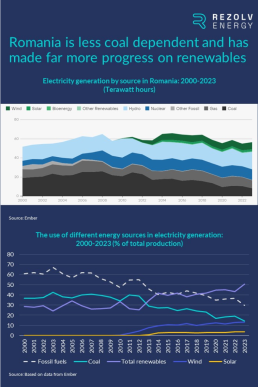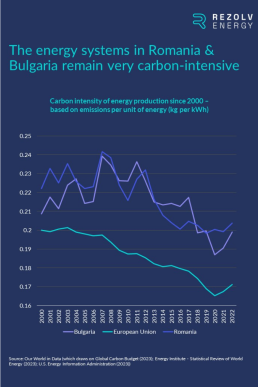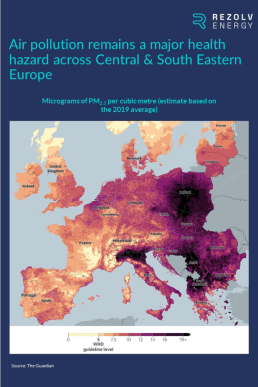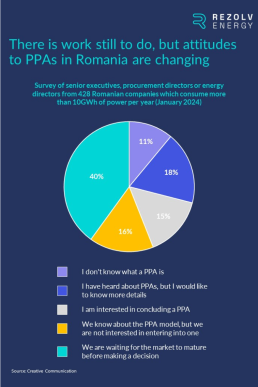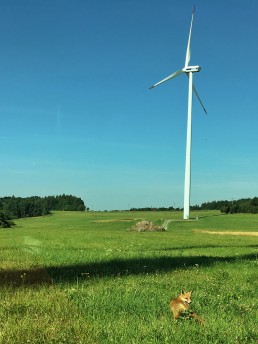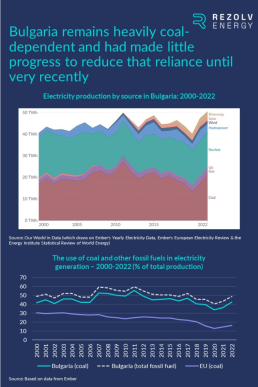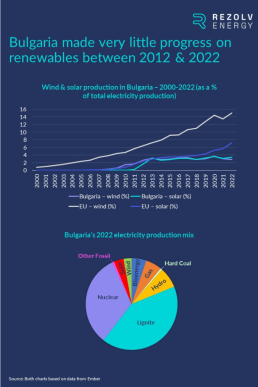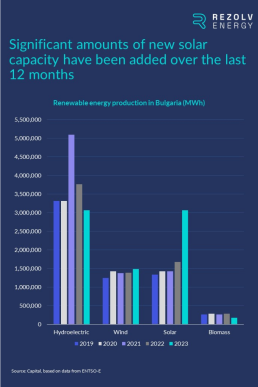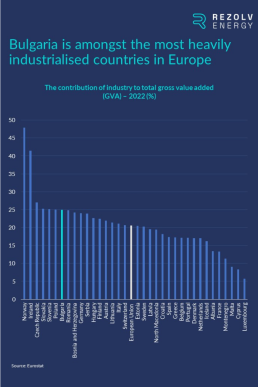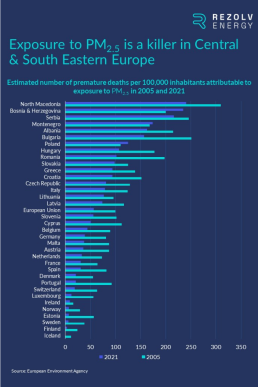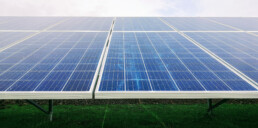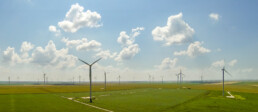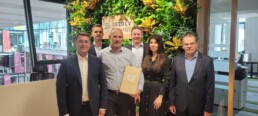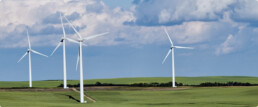Why is Rezolv investing in Romania?
We recently kicked off this series of articles on the clean energy transition in Central & South Eastern Europe by answering the question: why is Rezolv investing in Bulgaria?
By the time we announced St. George, our 229MW solar PV project in north-eastern Bulgaria, we had already confirmed that we would be building more than 2GW of clean power in Romania, through three separate projects: Dama Solar, a 1,044MW plant in north-west Arad County, which will be the largest solar project anywhere in Europe once it is operational; the Dunarea East & West wind farms in Constanța County which, at 600MW, will become one of Europe’s largest onshore wind projects; and the 450MW VIFOR wind farm in Buzău County. The wind farms are being developed by Rezolv in partnership with Low Carbon.
So, let’s now consider Romania in more detail: why is Rezolv investing there?
An ‘emissions first’ approach in Romania too?
For Bulgaria, we talked about an ‘emissions first’ approach: Bulgarian electricity production is still heavily dependent on fossil fuels – specifically brown coal, or lignite, which causes the highest CO2 emissions per ton when burned, one-third more than hard coal and three times as much as natural gas. Replacing lignite production with renewables delivers the maximum possible emissions reduction impact. Does the same ‘emissions first’ rationale justify investing in renewables in Romania?
The answer is ‘yes’, but the context in Romania is a bit different.
Last year, the percentage of electricity generated from fossil fuels dropped below 30% for the first time. That’s primarily explained by the growth of renewable energy, with overall renewables capacity increasing from 43.1% in 2022 to 50.4% in 2023, comfortably the highest level it has ever been:
Doesn’t Romania’s much stronger track record on renewables undermine the ‘emissions first’ argument for investing there? No.
For two main reasons:
First, despite everything that we have just outlined, the carbon intensity of energy production in Romania – the amount of CO2 emitted per unit of energy – is even higher in Romania than it is in Bulgaria:
Second, air quality in Romania remains a significant problem. When we considered Bulgaria in the first article of this series, we explained that while there are many different air pollutants, one of the most significant for human health is fine particulate matter (PM2.5), because exposure to PM2.5 at above recommended levels is a leading cause of premature death and disease (particularly stroke, cancer and respiratory disease).
While average air quality is worse in Bulgaria than it is in Romania, Romania is still fourth on the EU list when it comes to premature deaths attributable to exposure to PM2.5 – behind only Bulgaria, Poland and Hungary. This map illustrates the point very clearly:
A rapid reduction in energy sector emissions will therefore have more than a significant climate impact: it will also have a direct, tangible impact on the health of the Romanian public.
The energy transition is an economic priority in Romania as well
There is one other very important area in which Romania and Bulgaria are similar. In the previous article, we showed how Bulgaria is amongst the most heavily industrialised economies anywhere in Europe. The situation in Romania is almost exactly the same, with much of Romania’s industry also integrated into the supply chains of major multinational companies – many of whom have committed to comprehensive net-zero and renewable energy targets. To remain part of those supply chains – which, in many cases, will be essential for their long-term viability – those Romanian firms will need to meet their major customers’ renewable energy consumption requirements by procuring clean power.
This reality has started to dawn on many energy-intensive companies in Romania. Creative Communication recently ran a survey of 428 Romanian companies that consume more than 10GWh of power per year, asking them for their views on procuring renewable energy through power purchase agreements (PPAs). At first sight, the results might not look overwhelmingly positive, but they are actually very encouraging:
Why is this encouraging? Because if that same survey had been run 12 months ago, there would have been far higher numbers in the “I don’t know what a PPA is” and “We know about the PPA model, but we are not interested in entering into one” categories.
How to accelerate the PPA market in Romania
It is also encouraging because some of the concerns that we know exist – specifically, in the 40% of businesses that said they were waiting for the market to mature before making a decision – can be addressed. In two main ways:
First, this problem will ease over time. The first PPA was only signed in Romania in 2021, so it is a relatively new concept. There is a change in buying habits. You are asking a company that has always bought electricity annually through an energy trader to sign a contract for a 10+ year period directly with an energy producer. It’s a big step, in terms of financial commitment but also confidence and risk appetite, and it’s therefore understandable that buyers are cautious. However, expect to see a raft of PPAs being signed in 2024 – and this, gradually, will change the game. In the meantime, the task for stakeholders in the renewable energy sector – including Rezolv – will be to continue to educate consumers and help them through this change in paradigm. As the survey shows, there is a knowledge gap but it’s also a psychological barrier more than anything else, and it can be overcome.
Second, there is one remaining regulatory barrier holding the PPA market in Romania back – which is even more straightforward to fix. This concerns Guarantees of Origin (GOs). GOs prove to a final customer that the energy they are buying was produced from renewable sources. They are a critical component of corporate PPAs. Without them, PPA buyers cannot verify the type of electricity they are using and are unable to meet strict carbon accounting requirements, or prove compliance with RE100 and SBTi rules. Crucially, for the multinational firms that are currently driving most of the demand for PPAs, GOs also need to be transferrable between EU member states.
It is this ability to transfer GOs across borders within the EU that is the problem in Romania because it is only possible if the GOs are certified by a European body called the Association of Issuing Bodies (AIB) – and Romania is one of only two member states which is not a member of the AIB or in the process of applying to join. This is a clear barrier to the development of the PPA market and the renewable energy industry in Romania, via the main trade associations, are pushing for the government to remedy it very soon. This is also important for Romania as the EU has placed access to PPAs as one of the key elements of the electricity market reform that was agreed late last year.
PPAs are not just a way for corporates to benefit from the energy transition, they are a way for them to contribute
Applying for AIB membership is the policy change which would have the biggest impact on the renewable energy sector in Romania because, as we touched on in the first article of this series, PPAs are not just about corporate off-take. They also help finance renewable energy projects, so removing barriers to PPAs is the quickest way to increase renewable energy capacity.
Explaining this connection between PPAs and project financing is an important part of the education process in Romania. Happily, the message is getting through. Increasingly, Romanian companies are understanding that the opportunity in a PPA is not just to ensure their long-term supply of clean power at a stable price. It will also help build the project that will supply them. A PPA is therefore not just a way for them to benefit from the energy transition, it is a way for them to contribute. Also, they can claim “additionality” because they are supporting renewable energy generation which is new rather than already available – so, through a PPA, they are delivering a material impact on reducing fossil generation and displacing carbon emissions.
This is particularly attractive if the off-taker knows that the project will be constructed and operated to the highest ESG standards: that the developer is fully committed to protecting nature at the project sites, and to leaving a lasting, positive legacy in the local communities.
Take Rezolv’s Dama Solar project in Arad, for example, where there will be a particular emphasis on integrating symbiotic agricultural activities. The land on which the project will be built has been over-cultivated in the past, so is now poor quality from a farming perspective. As part of the project plan, it will be returned to pasture, with sheep managing the vegetation through grazing. We are also looking to incorporate beekeeping and other measures to increase biodiversity. As with all of our projects, there will also be a long-term investment programme at Dama Solar which will go well beyond local job creation to ensure that the project creates economic value and a range of other benefits to the people of Arad. It is a project with which any corporation would be proud to be associated.
Summing up
Romania has made good progress on renewables compared to other countries in SEE. However, that does not undermine the ‘emissions first’ motivation for investing in renewables there because Romanian energy production is still carbon intensive and air quality remains poor across the country. The rapid development of the PPA market is the fastest way to expand renewables capacity. And the quickest way to release the handbrake on PPAs would be Romania announcing its application to join the AIB.
What is coming up next time?
There is one other factor which helps answer the “why Romania?” question that hasn’t been explored here: Romania has enormous renewable energy potential, which is one reason why its 2030 fossil fuel reduction and renewables growth targets remain challenging.
And in the next article in this series, this is the topic we will be exploring. Turning our attention to the whole of Central & South Eastern Europe, we will see which countries in the region have made the most progress on wind and solar, and which have the most still to do…
Why is Rezolv investing in Bulgaria?
Rezolv launched 18 months ago to accelerate the energy transition in Central & South Eastern Europe. We already have well over 2GW of clean energy being prepared for construction. This includes St. George, which will become one of Bulgaria’s largest solar plants, and Dama Solar, which will be the largest solar project anywhere in Europe once it is operational. We also have more than 1GW of wind power under construction in Romania.
When you tell people that story, it typically leads to one question: why Romania and Bulgaria?
This is the first in a series of articles that we will be publishing about the clean energy transition in Central & South Eastern Europe. We’re going to start by focusing on Bulgaria. The second article, which will be out in a couple of weeks’ time, will answer the ‘Why Romania?’ question.
An ‘emissions first’ approach.
So why Bulgaria?
There isn’t a straightforward, single factor answer to that question. There are various reasons, many of which are connected to the characteristics of the St. George project. St. George will be built on the site of the former Silistra airport, a decommissioned airfield covering 165 hectares. At 229MW, it is, like all of Rezolv’s projects, utility-scale. Solar projects of this size require a few different things – not least available land, good solar irradiation and capacity for grid access close to the site. St. George had all of these things.
But if you zoom out from the specifics of the project, there is a broader answer to the question which helps explain Rezolv’s mission – and that of Actis, Rezolv’s single shareholder. Actis is one of the world’s most respected energy investors, and one of the reasons Actis prioritised Central & South Eastern Europe is because it is a region which has historically relied on fossil fuels for most of its energy needs. Replacing fossil fuel production with renewables delivers the maximum possible emissions reduction impact – an ‘emissions first’ approach which aligns with the sustainability policies which are now being adopted by some of the world’s biggest companies, including Meta, Amazon and General Motors.
Bulgaria is a perfect example of this emissions reduction potential. Bulgarian electricity production is still heavily dependent on fossil fuels – particularly brown coal, or lignite, which makes up more than 85% of that fossil fuel total. This is a major problem because while lignite is the cheapest source of electricity from fossil fuels, it causes the highest CO2 emissions per ton when burned, one-third more than hard coal and three times as much as natural gas.
In 2022, 48.8% of Bulgaria’s electricity generation was produced by fossil fuels, almost identical to the situation in 2000 – so limited progress was made in the 20+ years leading up to 2022 in reducing Bulgaria’s dependence on lignite:
One explanation for this is that, over the same period, Bulgaria made limited progress in developing wind and solar capacity. Bulgaria was a relatively slow-starter on renewables: wind power was introduced, in small quantities, in 2006; solar production only got going in 2010. Both industries experienced a ‘boom’ between 2010 and 2013, but after that, the ‘pause’ button was pushed on new renewables capacity for a decade:
The good news is that the wheels are now turning and the energy transition is well underway in Bulgaria – in particular on solar, where capacity increased by more than 80% in 2023:
The energy transition is an economic as well as a political priority
This progress on solar establishes the extent to which the energy transition has become a political priority. The main drivers are obvious. First, the need to enhance energy security by reducing dependence on foreign sources of energy has, of course, risen to the top of the political agenda since the start of the war in Ukraine. And second, Bulgaria has some challenging climate targets to hit (a topic we will be returning to later in this series).
But there is also a third, slightly lower-profile factor: accelerating the energy transition has become an economic imperative too. Bulgaria is amongst the most heavily industrialised economies anywhere in Europe:
Later in the series, we will explore this factor in more detail, but for now, it is sufficient to note that much of Bulgaria’s industry is integrated into the supply chains of major pan-European industrial businesses. More and more of these multinationals are committing to comprehensive net-zero and renewable energy targets. However, in most cases, they have moved faster in this area than the majority of their suppliers – who will need to catch up quickly and meet their major customers’ renewable energy consumption requirements if they are to hold on their contracts. Enabling Bulgarian companies to procure clean power will therefore be vital to their long-term viability – and to the economic competitiveness of the country as a whole.
The PPA potential in Bulgaria
For this reason, the news just before Christmas that the Bulgarian Sustainable Energy Development Agency (SEDA)’s application to join the Association of Issuing Bodies (AIB) had been accepted was hugely welcome. This concerns guarantees of origin (GOs), which prove to a final customer that the energy they are buying has been produced from renewable sources. AIB membership is necessary for GOs to be transferred between EU member states, which is essential for many of the multinational firms that are driving the demand for power purchase agreements (PPAs). AIB membership will therefore remove a key barrier to the signing of corporate PPAs in Bulgaria – which will also lead to more renewable energy projects being built there.
The impact of renewable energy on the Bulgarian public
Finally, let’s not forget the impact of renewable energy on the general public. In Bulgaria, the growth of wind and the further development of solar will have a direct, tangible impact on human health, which is another reason why investing there is so attractive. This is specifically because air quality remains a huge problem. There are many different air pollutants, but one of the most significant for human health is fine particulate matter (PM2.5), with exposure to PM2.5 at above recommended levels a leading cause of premature death and disease (particularly stroke, cancer and respiratory disease).
PM2.5 levels are a serious problem across the whole of Central & South Eastern Europe. Across the region, the European Environment Agency concludes that high PM2.5 levels are “due primarily to the burning of solid fuels like coal for domestic heating and their use in industry”. And it’s a killer – with Bulgaria number one on the EU list when it comes to premature deaths attributable to exposure to PM2.5:
This focus on the human dimension of the energy transition translates to local community relations as well. Rezolv has always taken the view that, without the support of the communities that live close to our sites, we would not be able to build and operate our projects successfully. Leaving a lasting, positive legacy for local communities is more than just the right thing to do: it’s business critical. We are therefore committed to creating long-term value for the communities living around St. George by working with local stakeholders to create opportunities and improve living standards for local people – both current generations and those to come. In so doing, we intend for St. George to set a standard for the responsible development of renewable energy projects in Bulgaria which others will be inspired to follow.
Summing up
So, to sum up, why are we investing in Bulgaria? Because the development of renewable energy will have a tangibly positive impact on human health there. And because the energy transition is at the heart of Bulgaria’s ongoing industrial competitiveness, with PPAs offering Bulgarian companies an emissions reduction guarantee – as well as long-term price stability and peace of mind over the security of supply. On top of that, PPAs help finance the construction of new renewable energy projects. It’s a virtuous circle.
What is coming up next time?
Is this context the same in Romania? Not exactly. There is still an ‘emissions first’ rationale for investing there, but the investment case is not identical.
And that is what we will be exploring next time…
Rezolv Energy acquires rights to develop Bulgaria’s largest solar plant
- The 165-hectare, 229 MW installed capacity plant, acquired from YGY Industries JSC, will be situated in Silistra Municipality in north-eastern Bulgaria
- Named ‘St. George’, the plant is expected to be online in early 2025; its installed capacity will be equivalent to 13% of Bulgaria’s current solar energy production
- Rezolv Energy already owns more than 2GW of clean energy being prepared for construction in Romania, including what will be Europe’s largest solar project
Rezolv Energy, an independent renewable energy producer focused on Central and Southeastern Europe, has acquired the rights to build and operate a 229 MW solar plant in Silistra Municipality in north-eastern Bulgaria. Named ‘St. George’, construction is due to start before the end of this year; the plant is expected to be completed in early 2025. Once constructed, it will be the largest solar plant in Bulgaria.
Rezolv has acquired the project from Bulgarian company YGY Industries JSC, owned by Mr. Yavor Georgiev.
St. George will be built on the site of the former Silistra airport, a decommissioned airfield covering 165 hectares. The project will comprise nearly 400,000 solar panels. With an average annual power generation of 313 Gigawatt hours (GWh), it will produce the equivalent of 13% of Bulgaria’s currently-installed solar power.
The plant will be connected to the main 110 kV transmission grid via two independent connection lines totalling about 6 kilometres in length. The power will be sold to commercial and industrial users through long-term Power Purchase Agreements.
The project will create a large number of new jobs in the construction phase. Approximately 500 Full Time Equivalent (FTE) employees will be hired, both for light assembly – which is work suitable for men and women, on both a full-time and part-time basis – and highly-skilled engineering roles. Longer term, the power plant will provide local employment for skilled and semi-skilled labour throughout the 30 plus years of operation.
St. George will be designed, constructed, and operated to the highest environmental, social and governance (ESG) standards.
Rezolv Energy was launched last year by Actis, a leading global investor in sustainable infrastructure. Rezolv already has more than 2GW of clean energy being prepared for construction in Romania, including the 1,044 MW Dama Solar project, which will become the largest solar plant in Europe once it is operational.
“Solar will make up almost 13% of Bulgaria’s total installed capacity this year, and estimates suggest that close to 6GW of solar power will be generated by 2030. We are very proud that St. George will be such a major part of that growth story. It will help Bulgaria meet its renewable energy targets and contribute to its energy independence. Crucially, for the business sector, it will also enable us to provide highly competitive, subsidy-free clean power at a stable price for industrial and commercial users right across the country.”
– Alastair Hammond, Chief Operating Officer
“Rezolv continues to go from strength to strength and we are delighted to be funding its investment in such an important project. Actis’ ambition is to make a substantial contribution to the Energy Transition in this region through major, large-scale projects which are constructed and operated to the highest sustainability standards. St. George is exactly the kind of project we had in mind when we took the decision to back Rezolv.”
– Jaroslava Korpanec, Partner and Head of Central & Eastern Europe at Actis
Rezolv Energy celebrates first year milestone
We recently gathered in Prague to celebrate a memorable event, marking Rezolv Energy’s one year of success. Today, as we officially turn one, it’s the perfect moment to pause and reflect on our remarkable journey over the past 12 months.
Our first year had two primary objectives that guided our every step. First, we set out to make significant strides towards our ambitious goal of building a multi-gigawatt portfolio of renewable energy projects across Central and Southeastern Europe. Second, we aimed to build a team of exceptional individuals, equipped with the expertise needed to support Rezolv’s growth in the coming years.
On the first priority, we are, of course, immensely proud to have over 2GW of renewable energy projects being prepared for construction. And there’s even more exciting news on the horizon—so stay tuned for further updates! It’s been a dream start.
What fills us with the greatest pride is the remarkable progress we’ve made on our second objective. The Rezolv team has grown to over 35 talented individuals from diverse backgrounds, representing 14 different countries. We have experts spanning various areas—operations, commercial, legal, finance, policy, business development, and ESG—essential pillars that support the continuous growth of our business. It is our people, more than anything else, that are the real foundation on which we will continue to build Rezolv.
Interested in being part of a fast-growing team that is already having a major impact on accelerating the energy transition in this region? Do drop us a line – we’d love to hear from you.
Rezolv announces 600MW of new onshore wind capacity in Romania
- New Adamclisi & Deleni wind farms will create one of Europe’s largest onshore wind projects
- Project is Rezolv’s third major deal since launching in August 2022
- Rezolv now has more than 2GW of wind and solar power in development
Rezolv Energy, an independent clean energy power producer focused on sustainable power in Central and South Eastern Europe, has announced its third significant deal since it was established in August 2022.
In partnership with Low Carbon, Rezolv will construct two onshore wind farms in Romania with a combined capacity of up to 600MW. Together with Rezolv’s recently announced 450MW Vis Viva wind farm and 1,044MW Arad solar farm, the business now has more than 2GW of renewable energy projects in late-stage development.
Sharing the same grid connection point, the two new wind farms will be located in the communes of Adamclisi & Deleni in Romania’s Constanta county. The sites will benefit from the region’s exceptional natural wind resources, flat terrain, and energy interconnection. Once operational, the wind farms will generate enough clean energy to power more than 332,000 homes and avoid approximately 220,000 tonnes of CO2e annually, making a significant contribution to both Romania’s and the European Union’s environmental targets for 2030 and 2050.
Low Carbon has been stewarding the Adamclisi & Deleni projects since 2020, when the investor first entered the transaction with local developers and Nero Renewables NV. Rezolv has now acquired a 51% stake in the projects, which are expected to reach financial close during the second half of 2023.
Rezolv launched earlier this year, backed by €500m from Actis, a leading global investor in sustainable infrastructure. The company aims to build a multi-gigawatt portfolio of wind, solar and energy storage across Central and South Eastern Europe, taking renewable energy projects from late-stage development through construction and into long-term operation. It will provide subsidy-free clean energy at a long-term, stable price for commercial and industrial users, and other off-takers, operating across the region.
“Companies and governments around the world are increasingly favouring the adoption of clean, cost-effective and quick-to-build renewable energy. With over 2GW of renewables now in development, we are proud to play a crucial role diversifying and increasing security of supply, while reducing central and eastern Europe’s dependence on non-renewable energy sources.”
– Jim Campion, Chief Executive, Rezolv Energy
“The central role of renewable energy in mitigating climate change is undeniable, and was a focal point of the recent COP27 summit in Sharm el-Sheikh. With wind and solar power set to provide two-thirds of global power generation by 2050 in long-term Paris-compliant energy scenarios, our latest project is set to make an important contribution to the continent’s energy transition, and its ambitious net-zero targets. The Adamclisi & Deleni projects will also make a significant contribution to Low Carbon’s own ambition to build 20GW of new renewable energy capacity, and achieve net zero, by the end of the decade.
We are delighted to deliver the project in partnership with Rezolv Energy, as part of our shared commitment to generating sustainable investments at scale for the benefit of future generations.”
– Roy Bedlow, Chief Executive at Low Carbon
“This announcement demonstrates our commitment to back Rezolv’s ambition to build a multi-gigawatt portfolio of wind, solar and energy generation over the next few years, helping companies and communities across the region meet their energy needs through clean, renewable energy generation that supports Net Zero targets.”
– Jaroslava Korpanec, Partner and Head of Central & Eastern Europe at Actis
Rezolv acquires rights to develop Europe's largest ever solar photovoltaic plant
- Actis backed Rezolv Energy was launched earlier this year to build a new era of sustainable power in Central and South-Eastern Europe
- 1,044 MW plant, acquired from Monsson, will be situated in western Romania
- Plant expected to be online by 2025, providing clean power to more than 370,000 households
- Potential to integrate symbiotic agricultural activities, including sheep grazing and beekeeping
Rezolv Energy, an independent clean energy power producer focused on sustainable power in Central and South Eastern Europe, has acquired from the Monsson Group the rights to build and operate a 1,044 MW solar photovoltaic plant in Arad County in western Romania. Once constructed, it is expected to be the largest solar PV plant in Europe.
The project is already in the late-stage development phase. Rezolv Energy is already appraising technology solutions and debt financing options with construction due to start in the first half of next year; it is expected to be online by 2025.
The plant will be covered by approximately 1.6 million new solar panels. With an average annual power generation of approximately 1,500,000 MWh, it is expected to be able to provide clean power for more than 370,000 households. The power will be sold to commercial and industrial users through long-term Power Purchase Agreements.
The project will be connected to the 400 kV high voltage overhead lines in the area and will likely include a 135 MW battery storage system, capable of delivering electricity for four hours. This will enable the high voltage lines to be smartly loaded, balancing the variability of the renewable energy supply.
The project will provide a large number of new jobs. During construction, at least 500 Full Time Equivalent (FTE) employees will be hired for a two-year period, both for light assembly – which is work suitable for men and women, on both a full-time and part-time basis – and highly-skilled engineering roles. At least 30 FTE employees will then stay on for the lifetime of the project. There will also be a focus on delivering training and skills development programmes for local communities in and around the project.
The project will be designed, constructed, and operated to the highest environmental, social and governance (ESG) standards, with a particular emphasis on integrating symbiotic agricultural activities on the site. Much of the poor-quality agricultural land will be returned to pasture, with sheep managing the vegetation through grazing. Recent research from the United States has shown the numerous advantages of this approach, confirming that the overall return from grazing is the same in both solar pastures and open fields with no PV panels. The project will also seek to incorporate beekeeping and other measures to increase biodiversity.
Rezolv Energy was launched earlier this year by Actis, a leading global investor in sustainable infrastructure, and the Rezolv leadership team, which had previously developed and run a portfolio of energy projects in Central and South Eastern Europe. Last month, the company announced that it was partnering with Low Carbon to deliver another major renewable energy project in Romania: the 450MW ‘Vis Viva’ onshore wind farm.
“We are moving into a new era for renewable energy in Europe. Projects like this will give us the scale to provide highly competitive, subsidy-free clean power at a stable price for industrial and commercial users. It will also make a significant contribution to Europe’s twin objectives of increasing its energy independence and reducing its net emissions to zero.”
– Jim Campion, Chief Executive, Rezolv Energy
“This transaction illustrates the scale of Actis’ ambition to invest in the Energy Transition across the world in general and in the CEE region in particular. At a time when energy security needs are driving faster adoption of renewable energy, we are excited to be funding Rezolv’s investment in Europe’s largest ever solar photovoltaic plant, expected to provide clean power to more than 370,000 households and constructed and operated to the highest sustainability standards. This transaction follows Rezolv’s announcement in September to deliver a 450MW wind farm in Romania, and we are working closely with Rezolv on further renewable energy investments which we hope to announce in early 2023.”
– Jaroslava Korpanec, Partner and Head of Central & Eastern Europe at Actis
Clifford Chance acted as legal advisor to Rezolv Energy on this transaction.
Rezolv launches to build a new era of sustainable power in Central and South Eastern Europe
- Independent clean energy power producer built on 15 years of experience
- Backed by €500m from Actis, a leading global investor in sustainable infrastructure
- Rezolv acquires late-stage development rights to 1GW of wind power in the region
Rezolv Energy, the independent clean energy power producer established to build a new era of sustainable power in Central and South Eastern Europe, has officially launched today.
Backed by €500m from Actis, a leading global investor in sustainable infrastructure, the company will provide subsidy-free clean energy at a long-term, stable price for commercial and industrial users, and other off-takers, operating across the region. This will include supermarkets, breweries, telecoms and other large businesses.
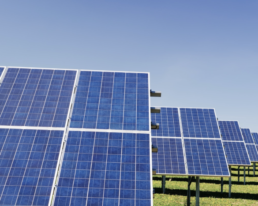
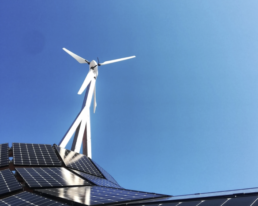
Rezolv aims to build a multi-gigawatt portfolio of wind, solar and energy storage. This will help companies and countries across the region meet their energy needs in response to energy security challenges and climate policies. It will take renewable energy projects from late-stage development through construction and into long-term operation.
At launch, Rezolv has signed agreements to acquire development rights to two wind projects in the Central and South Eastern Europe region with a combined capacity of 1GW. Construction contracts are expected to be awarded early next year, with the projects expected to be operational by 2025-2026.
The newly formed company is built on 15 years of clean energy heritage in the region. Its leadership team previously developed the largest wind farm at the time in both Croatia and the Czech Republic, and the largest independent wind farm in Romania.
“Rising energy costs, heightened security concerns, demand to meet climate targets, and stakeholder expectations, are causing a rethink on energy usage – and production. Today, private companies, as well as public utilities, are finding their traditional reliance on fossil fuels far less viable. Renewable sources of energy are ready to take the lead and Rezolv has been created to accelerate the energy transition. Our experience, combined with long-term investment from one of the world’s foremost energy investors, gives us the financial strength and experience to solve problems and accelerate large scale renewable projects across Central and South Eastern Europe.
As part of its strategy, Rezolv is also committed to upholding the very highest environmental, social and governance (ESG) standards. The company’s plan includes ensuring it leaves a lasting, positive legacy in each community where it invests and operates. Projects will adhere to best practice and international standards including the Equator Principles and the IFC’s Environmental and Social Performance Standards.”
— Jim Campion, Chief Executive, Rezolv
“Our model creates benefits for both the end-users of power, but also the communities where power is generated. We are developing long- term investment programmes hand-in-hand with communities. This ensures a positive legacy nationally, as well as locally, from the growth of renewables.”
— Alastair Hammond, Chief Operating Officer, Rezolv
“This announcement is an exciting moment for Actis as we sign our first Energy Infrastructure investment in Central and South Eastern Europe, with the ambition of building and operating a market-leading renewable energy platform. Our investment in the region strongly aligns with our strategy to build sustainability leaders where we find opportunities to support the Energy Transition, especially important as energy security needs drive faster adoption of renewable energy.”
— Lucy Heintz, Partner, Head of Energy Infrastructure, Actis

